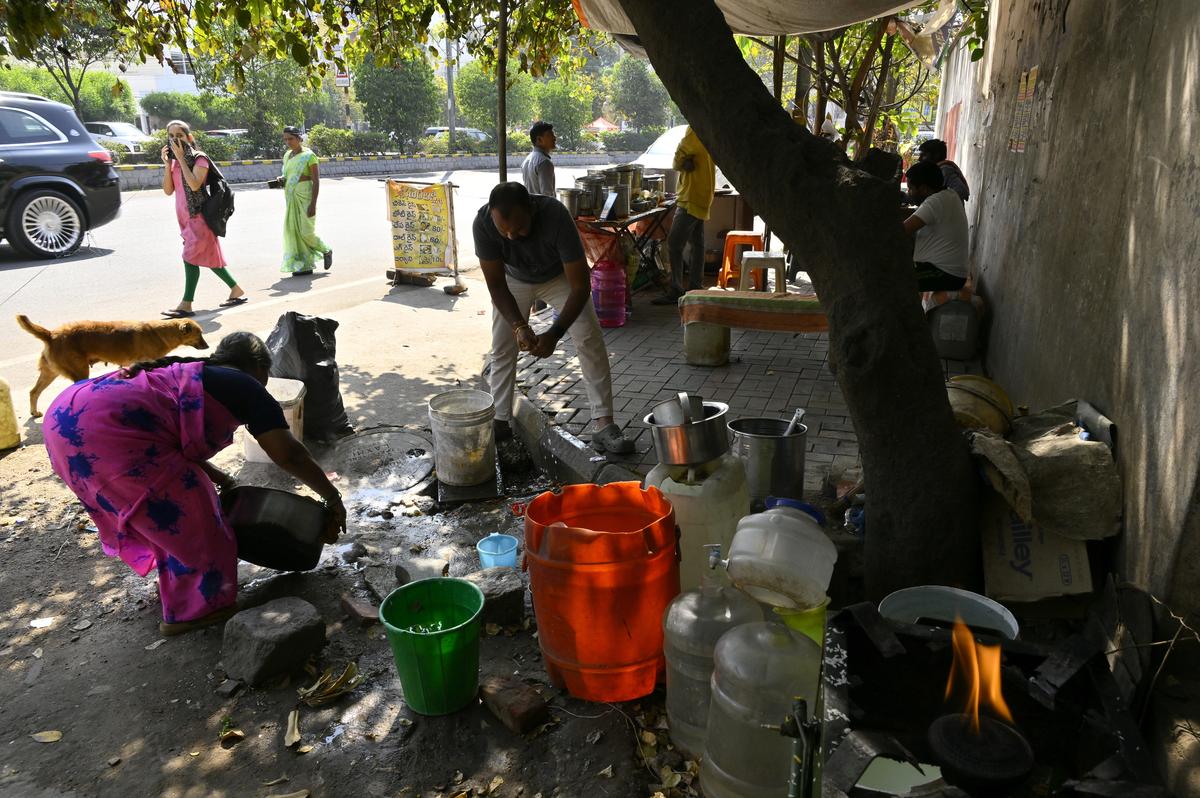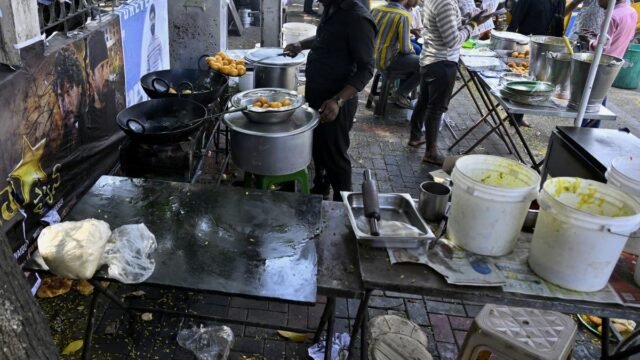On a chilly mid-November evening, 23-year-old Ravi’s craving for chicken biryani led him to Green Bawarchi Multi Cuisine Restaurant in Hyderabad’s Neredmet area. The aroma, the bustling diners, and the promise of a hearty meal all seemed inviting — until his indulgence spiralled into a medical emergency. Within hours, he doubled over in pain, vomiting and suffering from severe diarrhoea. His family rushed him to the hospital, where doctors diagnosed him with acute gastroenteritis, likely caused by contaminated food. He was immediately placed on an IV drip and prescribed antibiotics that saved his life.
Ravi’s ordeal is a tiny example of a growing public health crisis in Hyderabad as poor hygiene and food contamination plague eateries across the city. The tragedy of 32-year-old Reshma Begum, three weeks prior, highlights the deadly consequences of this growing crisis. On October 25, Reshma had a plate of momos from a streetside stall in Banjara Hills that left her battling with severe diarrhoea through the night. “The next morning, as she was heading to the bathroom, she collapsed and lost consciousness,” recounts her brother, Farooq Hussain.
Also read: Ahead of Deepavali, hygiene violations uncovered at Hyderabad sweet shops
Her family found her foaming at the mouth and frantically called for an ambulance. “The ‘108’ ambulance took about 30 minutes to arrive and when it did, the driver, who was alone, said he couldn’t carry her down from the third floor all by himself,” he recalls.
The family had to call neighbours for help. Almost half hour later, Reshma was admitted to the emergency room of Nizam’s Institute of Medical Sciences (NIMS), a top government tertiary care hospital in Hyderabad. “Another 30-40 minutes later, doctors broke the news that she could not be revived,” he says, sobbing.
Farooq and his family began making arrangements for Reshma’s funeral, unaware that others had also fallen ill after consuming momos from the same vendor. It was only when someone suggested that it could be part of a larger public health issue that they decided to request a post-mortem examination. They returned to NIMS, handed over Reshma’s body, and were assured that the report would be ready in 15 to 20 days.
“But it has been over a month and there is no update from the police or the hospital. When my father recently visited the police station to ask about the report, he was told it would take more time,” adds Farooq, who works as a driver for a ride-hailing platform and is the sole breadwinner for his family.
Expressing helplessness, he says, “If I spend my time running between police stations and hospitals, who will earn for my family?”
Reshma’s death has left her three children — a son and two daughters — in the family’s care, compounding their financial woes. “We are struggling to make ends meet, and the lack of answers only adds to our grief,” Farooq laments.
Questions and concerns over foodborne illnesses have been raised on social media of late. The rising number of such incidents caught the attention of city-based activist Robin Zaccheus, who urged food safety authorities to take action.
Food safety inspectors have now been visiting restaurants and uncovering a grim reality: the use of synthetic food colours, unsanitary conditions, and leftover food. Suspicious food samples have been collected for laboratory analysis, with officials promising further action based on the findings.
A blemish in gastronomic glory
Beneath Hyderabad’s celebrated culinary heritage is an undercurrent of food safety issues that impacts countless lives daily. While the city is renowned for its biryani, Irani chai, and vibrant street food culture, it also grapples with a web of challenges, including unregulated food practices, ageing infrastructure, and limited consumer awareness.
These issues not only jeopardise public health but also cast a shadow on Telangana’s burgeoning food industry. The city now stands at a critical juncture, as it confronts a difficult truth: preserving its gastronomic pride amid an urgent need for safer, more regulated food practices.

The city’s bustling street food culture is a culinary treasure but often comes with hidden risks. These vibrant open-air kitchens are often hotspots for hygiene violations.
| Photo Credit:
NAGARA GOPAL
One of the biggest challenges in ensuring food safety lies in consumer behaviour. While Hyderabad residents eagerly embrace new culinary trends, their awareness of food safety often falls short.
“I always check the expiry dates on packaged foods, but I never stop to think about where my vegetables come from,” admits Kiran, an IT professional who frequently orders meals online. This gap in awareness highlights the pressing need for better education on food safety standards.
The city’s bustling street food culture, from tangy panipuri to steaming haleem and kebabs, is a culinary treasure but often comes with hidden risks. These vibrant open-air kitchens are often hotspots for hygiene violations. Sriram, a college student, shares his dilemma: “I have had food poisoning twice after eating outside in recent times. But these places are affordable and so irresistible.”
Explaining the dangers of foodborne illnesses, medical gastroenterologist and chairman of AIG Hospitals-Hyderabad, D. Nageshwar Reddy says, “Food poisoning occurs when harmful germs like bacteria, viruses, or parasites enter the digestive system through contaminated food or water. Common pathogens such as Salmonella, E.coli, and Norovirus can damage the stomach and intestines, causing inflammation and disrupting digestion.”
Those germs can produce toxins that irritate the gut, causing symptoms like nausea, vomiting, diarrhoea and stomach cramps, leading to dehydration and a loss of body salts, he adds.
Viral infections, like those caused by Norovirus, spread quickly and show symptoms within hours, while bacterial toxins, such as those from Staphylococcus aureus, can cause severe discomfort. Most cases get better on their own, but prolonged symptoms, bloody diarrhoea, or severe dehydration need medical attention to prevent serious complications like infections spreading throughout the body, Dr.Reddy avers.
Asked why only a few people develop food poisoning despite many consuming the same meal at a restaurant or food stall, he says, “It comes down to individual immunity. Some people have built resistance to certain bacteria that they have been exposed to earlier. Those with co-morbidities like diabetes or hypertension are more vulnerable.”
Moreover, each person has a unique gut microbiome — the collection of microorganisms in the digestive tract — which plays a crucial role, he points out, adding, “A strong microbiome can effectively combat foreign bacteria, while a weaker one may allow infections to take hold.”

Fines and fixes
Amid these challenges, Hyderabad is witnessing proactive efforts to tackle food safety concerns. Between January and November this year, the Telangana Food Safety Department conducted 4,366 inspections, filed 510 cases, and initiated 56 prosecutions. Of those, 316 cases were resolved through adjudication, resulting in fines totalling ₹66 lakh for establishments found violating hygiene norms, says Commissioner of Food Safety R.V. Karnan.
Recent inspection drives have targeted high-risk areas, including educational institutions, hospital canteens, and street food vendors. At educational institutions, 516 inspections underscored the need for cook training in government hostels and mandatory Food Safety & Standards Authority of India (FSSAI) licences for PG accommodations. In a single week, 84 canteens across 45 government and 39 private hospitals were inspected, emphasising the importance of providing safe, quality food to patients and caregivers, according to Karnan.

Hot oil and fried snacks juxtaposed against an unclean environment, raising concerns about hygiene standards at a street food stall in Hyderabad.
| Photo Credit:
NAGARA GOPAL
To address street food safety, the department has trained about 1,500 vendors and issued FSSAI registration certificates to 3,774 of them.
Telangana currently has 90,797 registered Food Business Operators (FBOs), with 36,849 based in Hyderabad. Sector-wise, 19,234 deal in dairy products, 17,547 in prepared foods, 16,332 in bakery items, and 16,258 in cereals and cereal products. Other sectors include spices and salts (15,669), fruits and vegetables (12,200), oils and fats (11,733), eggs (5,961), and meat products (4,253). These numbers reflect the scale of the food industry and the critical importance of stringent safety measures.
Around 20,000 food establishments might be operating without proper registration, although official records show a fewer number, says an official of the Food Safety Department.

Keeping it clean amid challenges
In the lively neighbourhood of AS Rao Nagar in Hyderabad, nestled among a string of high-end apparel stores and shopping malls, lies Rajan Food Corner — a popular Chinese fast food spot. The modest setup features a compact 100-square-foot kitchen and a 150-square-foot seating area that can accommodate 12 to 15 people. Despite its small size, the restaurant buzzes with customers from morning until late in the night.
Running a busy eatery in such tight quarters can be challenging, but owner Rajan takes pride in maintaining high hygiene standards. “Unlike many small joints that operate with just two or three staff members, I have five people working here besides myself.
This helps in workload division and better coordination, thereby lowering chances of hygiene violations,” he explains. Rajan ensures freshness by buying chicken twice daily, instead of stocking up in bulk. “This way, I don’t reuse meat the next day. My vendor is authorised, so I trust the quality,” he adds.
On the other hand, Sardar Papaji Ka Dhaba, a 39-year-old iconic eatery in the bustling lanes of Hanuman Tekdi, stands in stark contrast. Like many restaurants, this dhaba features both traditional ground-floor seating and air-conditioned seating upstairs. But its standout feature is the open kitchen, which allow customers a clear view of the food preparation process.
“Food safety has become the talk of the town in recent months, but my family has upheld hygiene standards from day one,” says Ashmeet Singh, the dhaba’s third-generation owner.
He credits his grandfather for introducing the open kitchen concept. “His philosophy was simple; what happens behind closed doors cannot and should not be trusted,” he shares. This legacy continues, with Ashmeet’s mother preparing all the spices and masalas at home to ensure purity and to eliminate any risk of contamination.
The restaurant also relies on a trusted vendor for meat and vegetables, ensuring a steady supply of consistent, high-quality ingredients. “To date, we have never had a hygiene violation, and that’s a badge of honour we wear proudly,” says Ashmeet.
However, a major hurdle in food safety regulation across Telangana is the severe shortage of food inspectors and the strain on the State’s sole food safety laboratory. “The sanctioned number of food safety officers is 112, but only 47 are currently in position, leaving 65 vacancies,” an official from the department shares.
Telangana’s only food safety lab, located in Hyderabad’s Nacharam area, has been operational since 1971. “Currently, the lab takes 15 to 20 days to test each sample. While it is managing the workload, the increasing number of checks could soon stretch its capacity,” says a food safety inspector.
To address this, the government has approved the establishment of three food testing labs in Warangal, Mahabubnagar, and Nizamabad, which will double the State’s testing capacity. Further, a new state-of-the-art microbiology lab has been approved for the State Food Laboratory in Nacharam, informs Karnan.
FSSAI regulations tend to be more “business-friendly”, points out a food safety inspector, as they require that establishments be given an opportunity to rectify violations before any punitive action is taken.
Under the Food Safety and Standards Rules, when a hygiene lapse is detected, the establishment must first be notified and allowed time to address the concern before any enforcement measure is applied.
The inspector also highlights that the process involves considerable paperwork, with it taking up to two hours to completely fill out the necessary forms before issuing a notice for hygiene violations.
Ultimately, however, what matters is striking a balance between Hyderabad’s vibrant food culture and stringent food safety standards for safeguarding public health and supporting the city’s evolving food industry. Education, consistent regulatory oversight, and widespread adherence to food safety protocols are the way forward, notes an official.
Published – November 29, 2024 07:39 am IST








